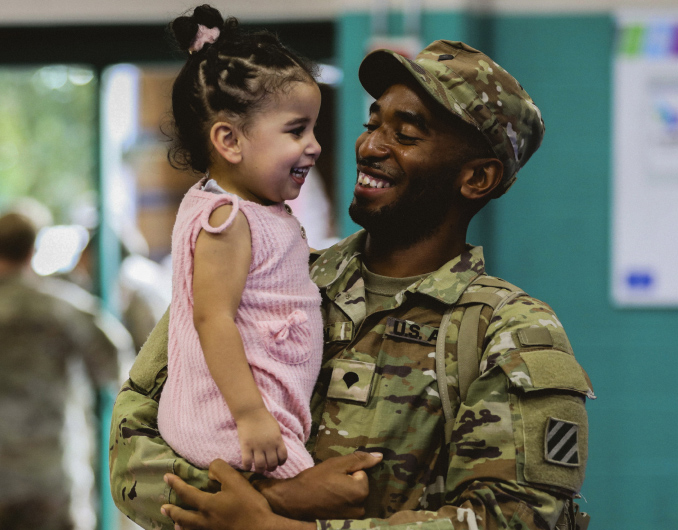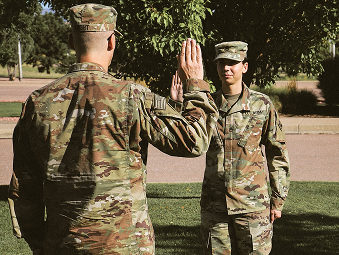Retirement & Pension Plans
Build the future you want.
Army retirement benefits are rewarding no matter how long you plan to serve. You’re automatically enrolled in a retirement savings account when you join and will receive a pension after 20 years of service.
Blended Retirement System (BRS)
-
401(k)-type retirement savings account with matching
-
Automatic enrollment when you join
-
Pension after 20 years of service
Save with every paycheck.
Build money over time by choosing to enroll in the Thrift Savings Plan, which is similar to a 401(k) plan and automatically puts a percentage of every paycheck into your retirement account. The government will then match up to 5% of your contributions.

1% automatic contribution
The Thrift Savings Plan automatically contributes 1% of every paycheck into your retirement account, and you can increase your contribution as much as you want.
5% government match
The government will match up to 5% of your Thrift Savings Plan contributions.
Fully vested in two years
Your retirement account is 100% vested after two years of service. You can move the funds to another retirement account when you leave the Army.
Get paid after you retire with a pension plan.
A pension plan pays you a steady paycheck for the rest of your life after you retire from service in the U.S. Army.
Serve 20 years to receive an Army pension.
After retiring, active-duty Soldiers can start pension payments at any age they choose—which are usually about 40% of your highest basic pay while serving. Army Reserve and Army National Guard Soldiers can claim them after turning 60 years old.
Earn more the longer you serve.
Your pension paycheck amount is associated with your highest rank while serving and is based on your highest three years of basic pay during service.
Have flexible payout options.
You can receive your Army pension in a lump sum at a reduced rate, which provides a large payment up front in exchange for less money over time, instead of monthly payments.
Be rewarded for loyalty.
At your mid-career mark, you can earn a one-time cash Continuation Bonus as part of the Blended Retirement System (BRS). To opt in, you’ll extend your contract with your current Army composition after eight years of service. You can then claim the bonus money anytime between the completion of eight years of service and before completing 12 years of service.

Take the first step.
Common questions about retirement and pension plans.
Not finding what you need?
Chat with us any time.
How long do I have to serve in the Army to get a pension?
How long do I have to serve in the Army to get a pension?
You must serve for at least 20 years to qualify for Army pension benefits. After retiring from at least 20 years of service, active-duty Soldiers can start pension pay at any age they choose. Army Reserve and Army National Guard Soldiers can start pension pay after turning 60 years old.
How much will my Army pension be?
How much will my Army pension be?
The amount of your pension paycheck varies based on when you join the Army. Active-duty, Army Reserve, and Army National Guard pensions are all calculated in the same way, regardless of which pension plan you choose.
You (and anyone who joined after 1986) will have a choice between two pension plans. One plan is called the High-36 Plan, which takes 50% of your average highest basic pay earned over 36 months, plus an additional 2.5% for each additional year served. The other plan to choose from is the Military Retirement Reform Act (MRRA), commonly known as REDUX.
Under the REDUX plan, you can receive a $30,000 Career Status Bonus (CSB) after 15 years of service if you agree to complete 20 years of service. In addition to the bonus, you’ll receive 40% of your average highest basic pay earned over 36 months, plus an additional 3.5% for each additional year served.
What disqualifies my Army pension?
What disqualifies my Army pension?
Your pension will be terminated if you are incarcerated for more than two months for a conviction of a felony or misdemeanor. However, payments may resume after leaving prison if you meet certain eligibility requirements.
What is Disability Retirement Pay?
What is Disability Retirement Pay?
Disability Retirement Pay is a monthly payment given to veterans who meet the disability requirements due to events that occurred during service, and to veterans whose service made an existing condition worse. Chronic illnesses and injuries may also qualify for these disability benefits. The pay is offered through Veterans Affairs (VA) and the amount is based on your disability rating with the VA. You can't combine disability pay with a VA pension, but you'll be paid based on the higher amount.